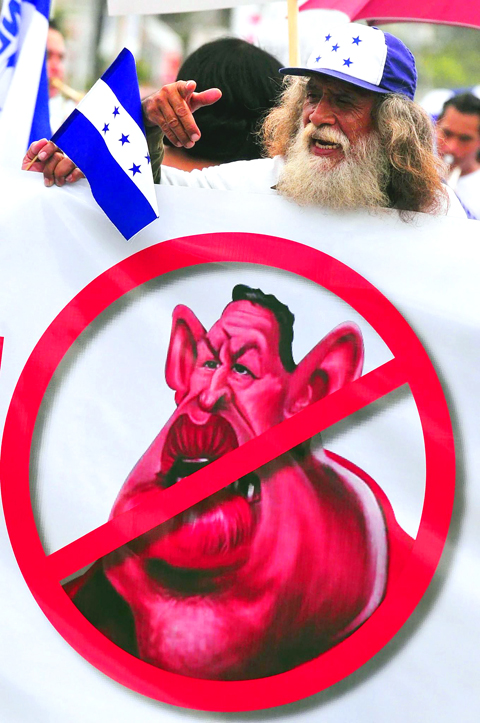Opponents of Venezuelan President Hugo Chavez held protests on Friday against the leftist leader in cities across Latin America, in an effort coordinated through Twitter, Facebook and a Web site titled “No More Chavez!”
They grasped banners and signs with images of Chavez in a straitjacket and wearing a red clown nose.
“Chavez, the shame of Bolivia,” read a banner in La Paz.

PHOTO: EPA
Police in Colombia estimated more than 5,000 marched in Bogota waving flags. Thousands also took to the streets in the capitals of Venezuela and Honduras. Some said they were protesting what they called Chavez’s growing authoritarianism, while others said he should stop meddling in other countries’ affairs.
Interim Honduran President Roberto Micheletti defended the June coup that deposed Chavez ally Manuel Zelaya while addressing protesters in Tegucigalpa.
“Any politician who tries to stay in power by hitching up with a dictator like Hugo Chavez, he won’t achieve it,” Micheletti said.
“We’ll stop him,” he said.
Chavez — who was traveling in Syria — ridiculed the protests on Thursday, likening Micheletti to a gorilla and saying: “Those who want to march, march with ‘gorill-etti,’ the dictators, the extreme right.”
Chavez supporters held smaller counter-demonstrations in Caracas, where about 100 people gathered, and elsewhere.
Turnout for the global anti-Chavez protest was far from massive in many cities. Crowds ranging from a dozen to 200 people gathered in New York, Sao Paulo, Madrid, Panama City and the capitals of Argentina and Ecuador.
Protest organizer Marcela Garzon in Colombia said there were no figures available on how many people participated globally, and that more important than the number was the opportunity to “express ourselves.”

Kehinde Sanni spends his days smoothing out dents and repainting scratched bumpers in a modest autobody shop in Lagos. He has never left Nigeria, yet he speaks glowingly of Burkina Faso military leader Ibrahim Traore. “Nigeria needs someone like Ibrahim Traore of Burkina Faso. He is doing well for his country,” Sanni said. His admiration is shaped by a steady stream of viral videos, memes and social media posts — many misleading or outright false — portraying Traore as a fearless reformer who defied Western powers and reclaimed his country’s dignity. The Burkinabe strongman swept into power following a coup in September 2022

‘FRAGMENTING’: British politics have for a long time been dominated by the Labor Party and the Tories, but polls suggest that Reform now poses a significant challenge Hard-right upstarts Reform UK snatched a parliamentary seat from British Prime Minister Keir Starmer’s Labor Party yesterday in local elections that dealt a blow to the UK’s two establishment parties. Reform, led by anti-immigrant firebrand Nigel Farage, won the by-election in Runcorn and Helsby in northwest England by just six votes, as it picked up gains in other localities, including one mayoralty. The group’s strong showing continues momentum it built up at last year’s general election and appears to confirm a trend that the UK is entering an era of multi-party politics. “For the movement, for the party it’s a very, very big

ENTERTAINMENT: Rio officials have a history of organizing massive concerts on Copacabana Beach, with Madonna’s show drawing about 1.6 million fans last year Lady Gaga on Saturday night gave a free concert in front of 2 million fans who poured onto Copacabana Beach in Rio de Janeiro for the biggest show of her career. “Tonight, we’re making history... Thank you for making history with me,” Lady Gaga told a screaming crowd. The Mother Monster, as she is known, started the show at about 10:10pm local time with her 2011 song Bloody Mary. Cries of joy rose from the tightly packed fans who sang and danced shoulder-to-shoulder on the vast stretch of sand. Concert organizers said 2.1 million people attended the show. Lady Gaga

SUPPORT: The Australian prime minister promised to back Kyiv against Russia’s invasion, saying: ‘That’s my government’s position. It was yesterday. It still is’ Left-leaning Australian Prime Minister Anthony Albanese yesterday basked in his landslide election win, promising a “disciplined, orderly” government to confront cost-of-living pain and tariff turmoil. People clapped as the 62-year-old and his fiancee, Jodie Haydon, who visited his old inner Sydney haunt, Cafe Italia, surrounded by a crowd of jostling photographers and journalists. Albanese’s Labor Party is on course to win at least 83 seats in the 150-member parliament, partial results showed. Opposition leader Peter Dutton’s conservative Liberal-National coalition had just 38 seats, and other parties 12. Another 17 seats were still in doubt. “We will be a disciplined, orderly